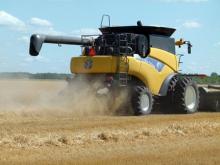As farmers work on the harvest, agriculture ministers from across Canada gathered in Winnipeg this week for the annual Federal-Provincial-Territorial (FPT) meeting. The annual event hosted by Manitoba Agriculture Minister Ron Kostyshyn and Federal Agriculture Minister Heath MacDonald provided a key platform to discuss shared challenges, policy priorities, and the future of Canadian agriculture.
The group focused on creating a resilient and competitive agriculture sector. Among the key topics discussed were international trade, animal health preparedness, business risk management, reducing red tape, regulatory modernization and improving service delivery.
For years, farmers and ranchers have raised frustration over the red tape and time involved in working with government programs, and the need to streamline the process including the product approval process through the CFIA and PMRA.
Agriculture Minister Ron Kostyshyn noted that while all provinces have their own challenges,its important to come together and have that discussion.
“We won't resolve it at that meeting. We won't resolve it probably in a week or two. But at least the message was brought forward, and the federal agriculture minister is taking that back to his government.”
He emphasized the importance of collaboration between federal and provincial governments, adding, “I left with the honest feeling that there was sincerity towards the importance of agriculture, and we couldn't have asked for a better discussion at the table.”
For Saskatchewan Agriculture Minister Daryl Harrison, attending his first FPT meeting, international trade was a central concern—particularly the province’s canola exports.
Harrison says everyone realized the importance of trade in general but specifically understood how important canola is.
“You know, 50% of our canola trade with China is Saskatchewan. So, it’s of the utmost importance to Saskatchewan to get this resolved sooner than later.”
He noted that Federal Agriculture Minister MacDonald understands that and is willing to advocate for that at the cabinet table as well.”
Trade action on Canadian canola and other commodities has significant financial and economic implications for the agriculture industry and the country. Ministers emphasized the importance of ongoing engagement with key trading partners, including the United States and China, while expanding and diversifying market access and enhancing critical infrastructure.
Last month, China imposed a 75.8 per cent tariff on canola seed, on top of tariffs already in place for canola oil, canola meal, peas, pork and seafood.
Beyond trade, ministers also focused on animal health and biosecurity, including African swine fever readiness, the Foot and Mouth Disease Vaccine Bank, and efforts to mitigate avian influenza.
Business risk management programming—particularly AgriStability—was another major topic. With national participation below 30%, Alberta Agriculture and Irrigation Minister RJ Sigurdson said the program isn’t meeting the needs of all producers.
“We know that improvements definitely need to be made on AgriStability so we create a program that will encompass all farms. We've seen a gap with our livestock producers, predominantly cow-calf. We're addressing that as a province, trying to lead the charge here in Alberta.”
“We have seen the federal government agree to some additional allowable expenses.” He added, “We look forward to putting the full suite of what we think should be on the table for consideration for AgriStability in the years to come.”
One of those improvements has already been approved: starting in 2026, feed costs for rented pasture will be considered an allowable expense.
Another pressing issue for farmers, especially in southern Saskatchewan and Alberta, raised was the surge in Richardson Ground Squirrel populations, which has become a major concern. Sigurdsson noted that the removal of strychnine has left farmers without an effective tool to manage the problem.
“It has gotten so bad now that we're starting to see physical damage to gas lines, water lines, fiber optic cables, and we're also seeing an incredible elevation in risk to livestock, including broken limbs.”
He continued, “That is why I was the first minister to declare a state of emergency and request reinstatement of strychnine so that we can manage this situation until an alternate tool is available. I brought this up at the FPT table and had a very frank conversation with Minister MacDonald about the urgent need.”
Alberta and Saskatchewan are calling for the temporary reinstatement of strychnine on an emergency use basis.
Overall, Sigurdson noted that discussions are great, but we need to see action.
"We need to see faster action from the Federal Government; our farmers and ranchers need it now more than ever given the current trade instability."
As the meeting wrapped up, ministers left with a renewed sense of cooperation and a shared commitment to advancing the interests of Canadian farmers and ranchers.
